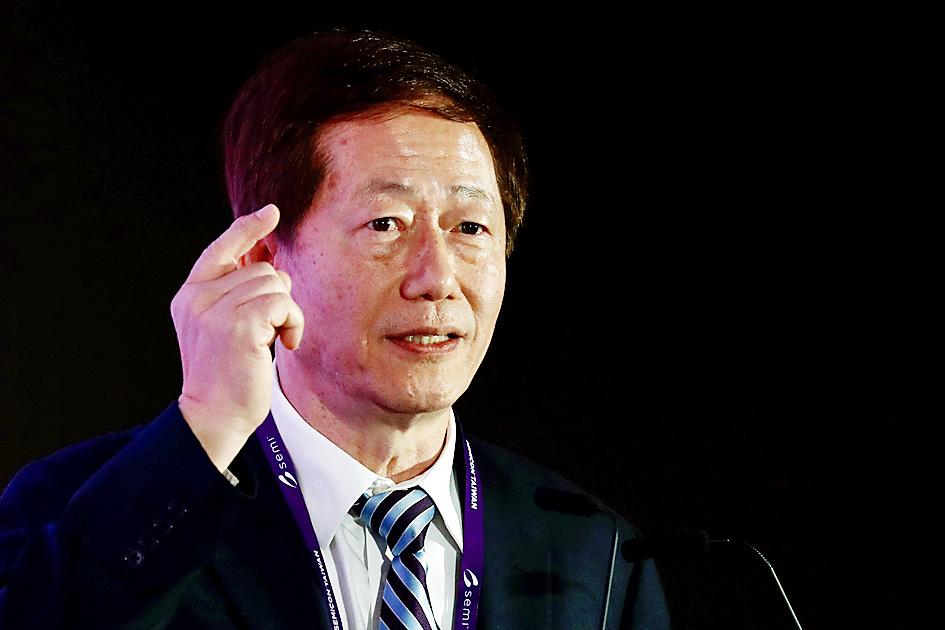The chip industry in Taiwan has been called its “silicon shield” because the world needs the support of Taiwan’s high-tech industry and would not let a war break out in the region, Taiwan Semiconductor Manufacturing Co (TSMC, 台積電) chairman Mark Liu (劉德音) said in an interview with a US television show host.
Speaking to CBS’ 60 Minutes host Lesley Stahl, Liu said that as a critical link in the global semiconductor supply chain, Taiwan’s chip industry is dubbed the “silicon shield” for a reason.
“That means the world all needs Taiwan’s high-tech industry support. So they will not let the war happen in this region because it goes against [the] interest of every country in the world,” he said in the interview, which aired on Sunday.

Photo: Ritchie B. Tongo, EPA-EFE
However, Liu would not comment if the chip industry is indeed keeping Taiwan safe, with some foreign experts saying that TSMC and other Taiwanese chipmakers are one of the reasons the West needs to help defend the country in the event of conflict with China.
“I cannot comment on the safety. I mean, this is a changing world. Nobody wants these things to happen. And I hope — I hope not, too — either,” he said.
Asked about US concerns that most chips are made in Asia amid an ongoing global shortage of automobile chips, Liu said that he understood such worries, but said that the main issue is not where the chips are being made.
“The shortage will happen no matter where the production is located because it’s due to COVID,” he said, referring to the pandemic.
Asked about US attempts to rebalance the supply chain, Liu said that instead of trying to move the supply chain, the US should invest in research and development to produce “more Ph.D., master and bachelor students” in the manufacturing field.
Liu said that TSMC expects to meet the minimum requirements of its auto customers before the end of next month.
However, that does not mean the auto chip shortage would end in two months, as the supply chain is long and complex, and that would take about seven to eight months, Liu said.

A magnitude 5.6 earthquake struck off the coast of Yilan County at 12:37pm today, with clear shaking felt across much of northern Taiwan. There were no immediate reports of damage. The epicenter of the quake was 16.9km east-southeast of Yilan County Hall offshore at a depth of 66.8km, Central Weather Administration (CWA) data showed. The maximum intensity registered at a 4 in Yilan County’s Nanao Township (南澳) on Taiwan’s seven-tier scale. Other parts of Yilan, as well as certain areas of Hualien County, Taipei, New Taipei City, Taoyuan, Hsinchu County, Taichung and Miaoli County, recorded intensities of 3. Residents of Yilan County and Taipei received

Taiwan has secured another breakthrough in fruit exports, with jujubes, dragon fruit and lychees approved for shipment to the EU, the Ministry of Agriculture said yesterday. The Animal and Plant Health Inspection Agency on Thursday received formal notification of the approval from the EU, the ministry said, adding that the decision was expected to expand Taiwanese fruit producers’ access to high-end European markets. Taiwan exported 126 tonnes of lychees last year, valued at US$1.48 million, with Japan accounting for 102 tonnes. Other export destinations included New Zealand, Hong Kong, the US and Australia, ministry data showed. Jujube exports totaled 103 tonnes, valued at

TRUST: The KMT said it respected the US’ timing and considerations, and hoped it would continue to honor its commitments to helping Taiwan bolster its defenses and deterrence US President Donald Trump is delaying a multibillion-dollar arms sale to Taiwan to ensure his visit to Beijing is successful, a New York Times report said. The weapons sales package has stalled in the US Department of State, the report said, citing US officials it did not identify. The White House has told agencies not to push forward ahead of Trump’s meeting with Chinese President Xi Jinping (習近平), it said. The two last month held a phone call to discuss trade and geopolitical flashpoints ahead of the summit. Xi raised the Taiwan issue and urged the US to handle arms sales to

BIG SPENDERS: Foreign investors bought the most Taiwan equities since 2005, signaling confidence that an AI boom would continue to benefit chipmakers Taiwan Semiconductor Manufacturing Co’s (TSMC, 台積電) market capitalization swelled to US$2 trillion for the first time following a 4.25 percent rally in its American depositary receipts (ADR) overnight, putting the world’s biggest contract chipmaker sixth on the list of the world’s biggest companies by market capitalization, just behind Amazon.com Inc. The site CompaniesMarketcap.com ranked TSMC ahead of Saudi Aramco and Meta Platforms Inc. The Taiwanese company’s ADRs on Tuesday surged to US$385.75 on the New York Stock Exchange, as strong demand for artificial intelligence (AI) applications led to chip supply constraints and boost revenue growth to record-breaking levels. Each TSMC ADR represents